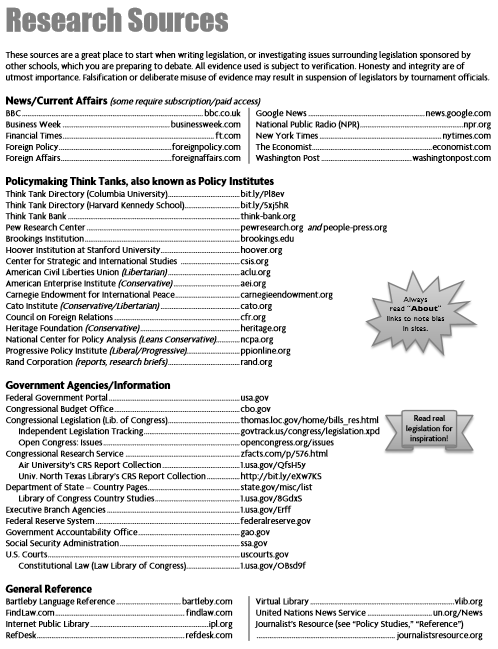Below you will find a list of various websites and media that can be used to refine and enhance your performances at tournaments. Remember that judging is subjective and the techniques listed below may not work in every round but they should provide an excellent resource to help your become even better.
Important Class Downloads
Speech and Debate Syllabus
Student Registration and Information Form
(please complete the above form and turn it in, with payment, to your coach)
Congressional Debate
Guide to Congressional Debate
º Bill Template
º Resolution Template

Duo Interpretation
Official 2013 CHSAA Duo Ballot and Guidelines
Duo Interpretation – Everything You Ever Wanted to Know (squidoo)
Extemp Resources
National Extempt Ballot and Guidelines
Standard Extempt Ballot and Guidelines
International Extempt Ballot and Guidelines
Extemp Website – Good practice questions
Extemporaneous Speaking / Public Speaking Event Resources
Lincoln-Douglas (LD) Debate
Introduction to Debate Handbook 1998
Everyday Debate – Core Values in LD
Common LD Values – more in-depth
CHSAA LD Ballot and Guidelines
NFL Introduction to LD
The Ultimate LD Debate Handbook
Lincoln Douglas Debate Resources (National Forensic League Website)
How to Construct a Lincoln Douglas Debate Case
Philosophy Resources
Philosophy Education Resource Guide
Philosophy: An Online Resource Guide
Philosophy and Other Related Research Topics
110 Free Philosophy eBooks
Stanford Encyclopedia of Philosophy
Philosophy Notes and Worksheets (Dornan Seminar)
Plato on justice, rights, and the ideal State (hint: not a democracy) Aristotle on justice, rights, and democracy Hobbes on the Social Contract, especially regarding sovereignty, punishment, and the State of Nature Locke on the Social Contract (but understand his foundations in empirical knowledge and natural theology, which grounds rights) Rousseau on the Social Contract Kant on rights, duties, and his formulation of morality encompassing both, The Categorical Imperative Mill on democracy, utility, free speech, and the Harm Principle Marx on justice, equality, societal values, revolution, and more Rawls on a new, pluralist approach to the Social Contract and “justice as fairness,” including the Original Position / Veil of Ignorance, the First and Second principle of Justice, democracy, neo-Kantianism Maslow on value, especially his Hierarchy of Needs |
de Beauvoir on ethics and gender Berlin on ethics (especially pluralism) and politics Dewey on moral and political pragmatism and democracy Hayek on freedom Hegel on Hegel Hume on the Social Contract Arendt on democracy and totalitarianism bon morality and law Dahl on democracy Schumpeter on democracy Kierkegaard on reason Aquinas on Natural Law and Just War Theory Popper on anti-Platonism Sartre on freedom and ethics Habermas on democracy and deliberation Nozick (especially against Rawls) on rights, freedom, and the Social Contract Foucault on rights and justice (especially concerning criminality and punishment) Beccaria on criminal justice and punishment Bentham on Utilitarianism Rand on Objectivism, especially as it concerns morality and freedom |
Other Program Ballots and Guidelines
Approved Online Interp Resources (use this to check for qualified performance pieces)
Humorous Interpretation Ballot and Guidelines
Impromptu Ballot and Guidelines
Original Oratory Ballot and Guidelines
Public Forum Ballot and Guidelines
Poetry Ballot and Guidelines
Creative Storytelling Ballot and Guidelines
Cross-Examination Ballot and Guidelines
Dramatic Interpretation Ballot and Guidelines
